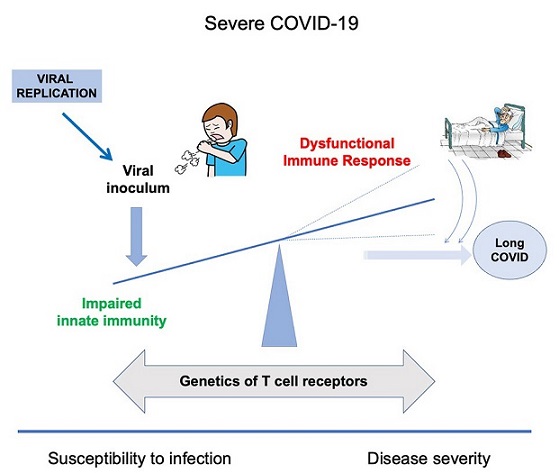Genetic Insights into Severe COVID-19 - Loss-of-Function in T-Cell Receptor Beta Genes and Dysfunctional Immune Responses
Thailand Medical News Team Aug 27, 2023 1 year, 7 months, 3 weeks, 6 days, 9 hours, 32 minutes ago
COVID-19 News: As the world grappled with the unprecedented COVID-19 pandemic, scientists and researchers worldwide scrambled to unravel the complexities of the virus's impact on human health. Among the many questions posed, the variability in disease severity among individuals stood as one of the most puzzling enigmas. Why did some experience mild symptoms or even remain asymptomatic, while others faced life-threatening complications? While factors like age, sex, and comorbidities provided some insight, the role of genetics in shaping the course of COVID-19 remained largely uncharted territory.
 Graphical Abstract
Graphical Abstract
In this pursuit of understanding, a groundbreaking study emerged, shedding light on a crucial genetic signature linked to severe COVID-19 outcomes. The study's findings challenged conventional wisdom and highlighted the intricate involvement of the immune system's T-cell responses in dictating disease severity.
This news study by researchers from United Kingdom, Spain and Uganda delves into the genetic insights of T Cell receptor (TCR) chain encoding genes more likely to be inactivated in the patient cohort T Cells.
Unraveling the Genetic Underpinnings
The study in question focused on the genetic factors underpinning severe COVID-19 cases, specifically homing in on the T-cell receptor beta (TRB) genes' locus on chromosome 7. T-cell receptors play a pivotal role in the immune response, enabling T cells to recognize and combat foreign invaders, such as viruses.
This study embarked on a comprehensive exploration of 205 whole exomes, meticulously comparing severe COVID-19 patients with a control group.
Surprisingly, the researchers unearthed a significant enrichment of high-impact alleles within the TRB locus in severe COVID-19 patients. The TRB genes analyzed, including TRBV6-5, TRBV7-3, TRBV7-6, TRBV7-7, and TRBV10-1, exhibited the potential for loss-of-function via compound heterozygosis. This genetic phenomenon pointed towards compromised T-cell responses, laying the groundwork for dysfunctional immune reactions against the SARS-CoV-2 virus.
Contextualizing the Study's Significance
To contextualize these findings, the study harkened back to the early days of the pandemic when Madrid bore the brunt of COVID-19 cases as reported past
COVID-19 News reports. The rapid surge in infections prompted the establishment of temporary hospitals to manage the influx of critically ill patients. While acute respiratory distress syndrome (ARDS) was a prominent feature, the study highlighted that other complications,
including thromboembolic events, contributed to the disease's severity.
The prevailing understanding of severe COVID-19 risk factors, such as age, sex, and comorbidities, prompted the researchers to design stringent criteria for patient selection. This approach aimed to identify genetic determinants independently of these factors. By focusing on a subset of patients younger than 60 years without comorbidities, the study aimed to unveil genetic markers intrinsic to severe COVID-19 outcomes.
Genetic Complexity and Immune Response
The human leukocyte antigen (HLA) system, a vital component of immune responses, plays a role in distinguishing between self and foreign entities. Pathogen-derived peptides anchored in HLA molecules are presented to T lymphocytes, initiating immune reactions. T-cell receptors (TCRs) are instrumental in this process, recognizing antigens presented by the HLA molecules. TCRs are generated through a complex rearrangement mechanism, resulting in diverse T-cell repertoires.
While prior knowledge primarily associated TCRs with responses to individual pathogen peptides, this study marked a significant leap. By identifying an association between loss-of-function TRB genes and severe COVID-19 outcomes, the study illuminated TCRs' broader role in complex antigen recognition, such as whole microorganisms like SARS-CoV-2.
Implications for Precision Medicine and Beyond
The implications of these findings ripple across multiple dimensions. Firstly, the study opens avenues for the development of precision medicine approaches to COVID-19 management. By identifying a genetic signature linked to severe outcomes, clinicians could potentially prioritize vulnerable individuals for tailored interventions, including earlier antiviral treatments, booster vaccines, and targeted therapies.
Secondly, the study underscores the importance of genetic diversity in research. As the study's scope was limited to Iberian Spanish patients, the call for broader analyses encompassing diverse populations becomes evident. Genetic determinants may vary across different ethnic groups, necessitating comprehensive studies for a comprehensive understanding of the disease's genetic landscape.
Challenges and Future Prospects
While the study's findings provide a critical breakthrough, challenges and avenues for future research also emerge. The study's focus on a relatively small sample size prompts the call for larger, more diverse cohorts to validate and generalize these findings. Additionally, understanding the intricacies of TCR responses in COVID-19 remains an ongoing challenge. Deciphering the balance between activation and exhaustion in T cells during infection holds the key to more effective therapeutic strategies.
Conclusion
As the COVID-19 pandemic catalyzed global scientific efforts, the study discussed in this article marks a pivotal moment in understanding the disease's genetic underpinnings. The revelation that loss-of-function TRB genes are linked to severe outcomes reshapes our comprehension of immune responses and paves the way for precision medicine interventions. However, this study also underscores the complexity of genetic factors in disease severity and emphasizes the need for collaborative, diverse research endeavors to combat current and future pandemics effectively.
The study findings were published in the peer reviewed journal: iScience.
https://www.sciencedirect.com/science/article/pii/S2589004223018126
For the latest
COVID-19 News, keep on logging to Thailand Medical News
